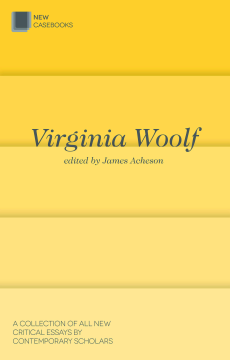
Additional Information
Book Details
Abstract
This collection of original essays on Virginia Woolf by leading scholars in the field opens up new debates on the work of one of the foremost modernists of the twentieth century.
The collection also looks at some of Woolf's own essays, discussing her theory of fiction and devotion to 'stream of consciousness' writing. Its thirteen contributors place this discussion of Woolf's artistic theory and practice within the context of her association with the Bloomsbury Group and her interest in spirituality, feminism, homosexuality, pacifism and psychoanalysis.
James Acheson presents a vibrant collection of brand new essays on Virginia Woolf's 'Mrs Dalloway' and 'To the Lighthouse'. A team of leading scholars provide stimulating re-assessments and fresh critical perspectives on these two major works of British fiction.
‘This book’s carefully contextualised, theoretically informed essays provide authoritative introductions to Virginia Woolf’s modernist aesthetics. With a wide range of topics covered, each chapter ensures that students will gain an enhanced understanding of two of the most innovative and important novels of the twentieth century.’ – Derek Ryan, University of Kent, UK
James Acheson is former Senior Lecturer in English at the University of Canterbury, Christchurch, New Zealand. His previous publications include a volume on John Fowles in the New Casebooks series.
Table of Contents
| Section Title | Page | Action | Price |
|---|---|---|---|
| Cover | Cover | ||
| Contents | v | ||
| Series Editor’s Preface | vii | ||
| Notes on Contributors | viii | ||
| Acknowledgements | x | ||
| List of Abbreviations | xi | ||
| Introduction | 1 | ||
| 1 Mind-wandering and Mindfulness: A Cognitive Approach to Mrs. Dalloway and To the Lighthouse | 16 | ||
| 2 Spirituality in Mrs. Dalloway and To the Lighthouse | 32 | ||
| 3 Victorian Roots: The Sense of the Past in Mrs. Dalloway and To the Lighthouse | 46 | ||
| 4 Modernism and Bloomsbury Aesthetics | 60 | ||
| 5 ‘Women Can’t Write, Women Can’t Paint’: Art and the Artist in To the Lighthouse | 74 | ||
| 6 On the Death of the Soul: a Jungian Reading of Mrs. Dalloway | 89 | ||
| 7 On Not Being Able to Paint: To the Lighthouse via Psychoanalysis | 106 | ||
| 8 Mrs. Dalloway and the War that Wouldn’t End | 125 | ||
| 9 Mrs. Dalloway and the Reinvention of the Novel | 139 | ||
| 10 Mrs. Dalloway and To the Lighthouse: The Novel as Elegy | 152 | ||
| 11 ‘What is a woman? I assure you, I do not know’: Woolf and Feminism in the 1920s | 165 | ||
| 12 The Warp and the Weft: Homoeroticism in Mrs. Dalloway and To the Lighthouse | 180 | ||
| 13 The Cambridge Woolf | 195 | ||
| Further Reading | 209 | ||
| Index | 212 |
